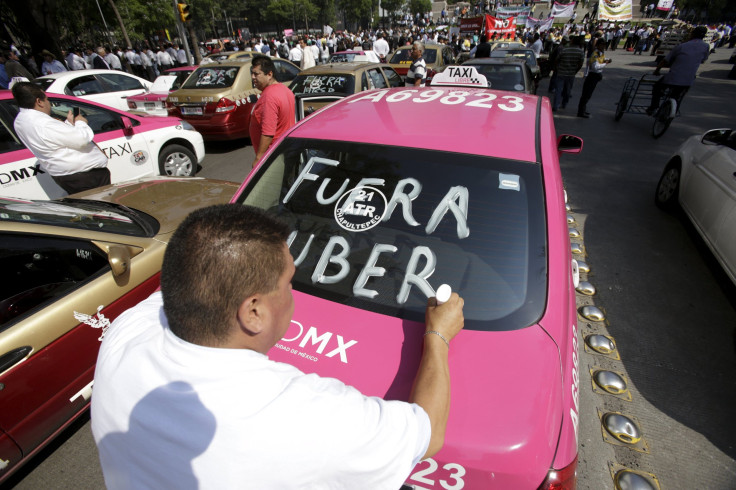Uber Backlash In Mexico Heightens As Taxi Union Warns It May Stop Paying Fees

Anger against app-based car services is still boiling in Mexico City, two weeks after taxi drivers protested en masse against what they consider unfair competition from companies like Uber. Now a Mexican taxi union warns it will mount a revolt unless the government begins regulating the competing services.
The Organized Taxi Drivers of Mexico City warned Thursday that it would refuse to pay government fees for licenses and insurance if the government doesn’t enforce the same regulations traditional taxi drivers adhere to on companies like Uber and competitor Cabify, which offer rides to customers through mobile phone apps. Those companies aren’t subject to the fees cabbies must pay or the courses they must pass to be licensed.
“If the government thinks there is no problem, the Organized Taxi Drivers of Mexico City will stop painting cars with the colors the government demands, stop paying [fees] and will stop renewing our license cards if the government doesn’t define this problem with certainty,” a union spokesman, Ignacio Rodriguez, said in a statement Thursday.
If all 19,320 registered taxi drivers in the union collectively refuse to pay their fees, it would result in an annual loss of 82 million pesos, or $5.3 million, from the treasury’s coffers, Rodriguez added.
“If Uber and Cabify don’t comply with the rules, neither will we,” said Daniel Medina, another spokesman for the union who spoke at the press conference.
Mexican taxi drivers’ resentment against companies like Uber have been simmering for some time, but in late May the backlash reached new heights as hundreds of drivers marched in the streets to show their discontent. Some drivers used their cabs to block roadways while crowds shouted, "!Fuera Uber!" (“Uber Out!”).
Uber responded by offering free rides to customers during the protests. Uber supporters also helped circulate the hashtag #UberSeQueda (“Uber Stays”) on Twitter in defense of the company.
Mexico City has one of the world’s largest taxi fleets, with more than 140,000 registered vehicles. But the growth of services like Uber is squeezing traditional taxi services, which already compete with a wealth of public transportation options for the city’s 20 million residents. Late last year, the union filed a lawsuit against Uber and Cabify, accusing them of breaking the law by not paying for government permits.
The taxi union has been in talks for several weeks with officials over how to regulate the app-based services, and the next roundtable discussion is set for Monday. But Rodriguez vowed that more protests will follow if the negotiations don’t lead to a fair solution.
© Copyright IBTimes 2025. All rights reserved.




















